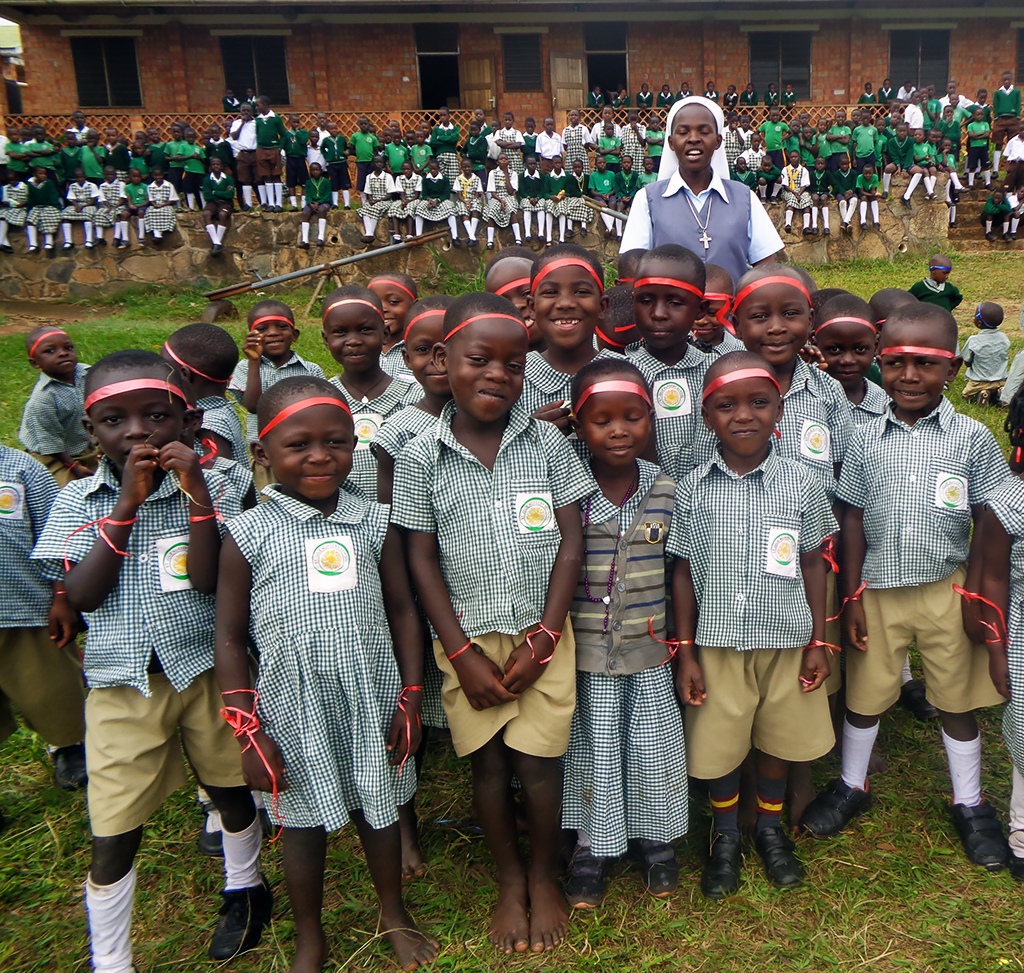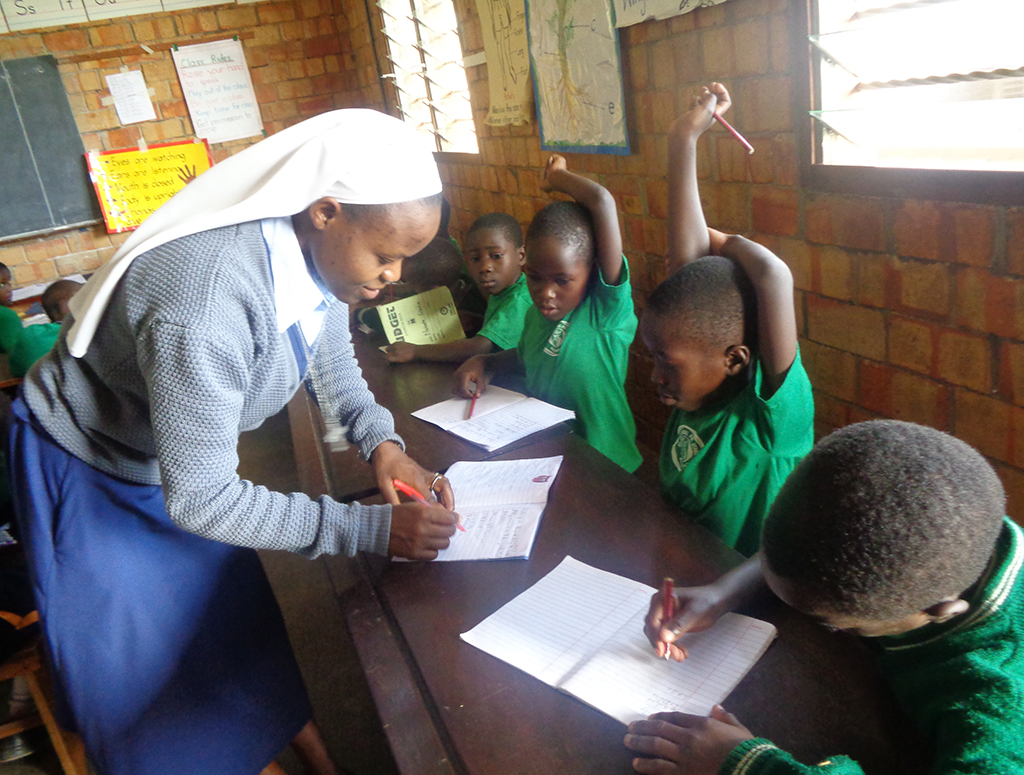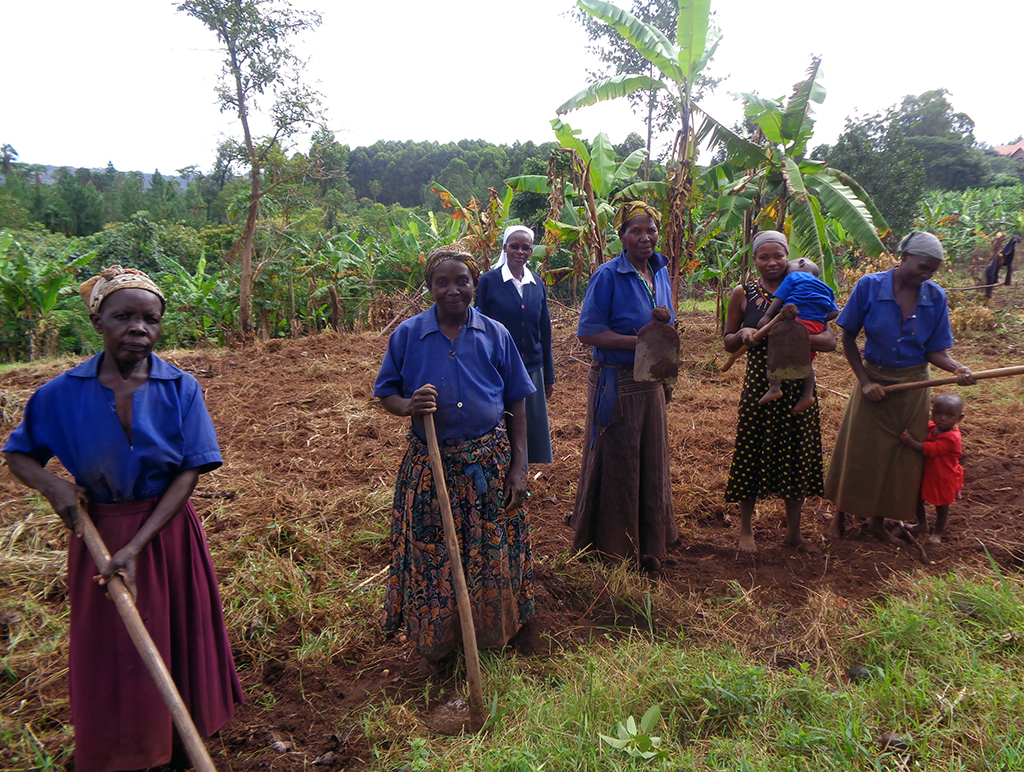Our missionary focus in East Africa is to educate impoverished children and teach women skills which empower their lives. A steady growth of missions in the East African countries of Uganda, Tanzania, and Kenya, led SND congregational leadership to decide that these missions were ready to become united as a general delegation under the sponsorship of the General SND Government in Rome.

Our global mission priorities include uniting the SND missions of these three diverse countries, educating young native sisters in leadership and professional studies, and making a long-term plan for the delegation to one day become a province. The formation of a delegation is the next step before they become an independent province.
The Holy Spirit General Delegation, also called the East Africa Delegation, was established on Pentecost Sunday, May 24, 2015, in Arusha, Tanzania. The initial leadership team included sisters from India, the US, and Africa. The team is now comprised entirely of African Sisters of Notre Dame.
Tanzania
Tanzania remains one of the poorest countries in the world, despite its political stability. Since the Indian SNDs arrived in Arusha in 1992, the primary objectives of the Tanzanian missions are education, healthcare, and women’s empowerment. The sisters have established a primary school, a formation house and the Zinduka Women’s Center. They have also taught in a secondary school in Shinyanga, and have begun a ministry with the Maasai people in remote Simanjiro.
Education

In 1992, three Indian Sisters of Notre Dame arrived in Arusha, Tanzania to begin their missionary work at the all-girls St. Joseph Diocesan Secondary School in Ngarenaro. The sisters soon realized that teen pregnancy and AIDS were pressing issues that needed to be addressed in tandem with local education needs. After the sisters assumed administration of St. Joseph, teaching was improved, the students grew in discipline, and the civil authorities began to recognize the positive influences of the sisters’ instruction. They were then invited to Shinyanga, 613 miles west of Arusha, to collaborate in running the Don Bosco Co-educational Secondary School.
A Special Ministry in remote Simanjiro
The sisters from Arusha began ministry with the Maasai people in remote Simanjiro in 2010, establishing a small outdoor classroom for the children. With the support of the Sisters of Notre Dame in Münster, Germany, and their students, graduates and friends, a school and convent were built. The interfaith celebration for the opening consisted of Maasai villagers contributing livestock, a Muslim sheikh as the chief cook, and choirs from the Catholic and Lutheran churches singing at Mass.
Recently the sisters organized the people to work with the government to build a water storage tank near the village pump, providing clean drinking water for people who formerly relied on water holes shared with livestock.
Health Care
There are almost two million orphans in Tanzania, many of them HIV-infected. An Indian sister nurse who had come to Africa in 2005 to offer medical instruction at the Women’s Center began to reach out to these children. She formed a group called the Aloysia Children, named after the foundress of the Sisters of Notre Dame, who was an orphan herself. In summer 2012, the sisters established a home in Kiomboi for children who are orphaned or in other difficult situations.
Empowerment for Women
The sisters gathered women with leadership potential to draw up a plan for what was to become the Zinduka Women’s Center. There the sisters work to assist women to grow in socio-economic self-reliance by tapping into local resources, becoming agents of social change, developing their talents, increasing literacy, and beginning income-generating programs.
Uganda
Sisters of Notre Dame from Covington, KY and Los Angeles, CA arrived in Buseesa in 1995 to assist in improving the educational program in the remote rural diocese. The sisters came to share, to learn, and to live with the people of Buseesa, a very remote location in the Uganda bush area. The sisters were drawn to the deep faith and friendliness of the people, their giving from the little they had, and their great desire for education for their children. After considering several sites for a school, St. Julie Mission was established.
St. Julie Mission
In just over two decades, St. Julie Mission has grown from a small plot in the isolated bush of Uganda to a compound made up of a primary boarding school, a nursery school, a formation center, a farm, and a top-ranked, all-girls secondary boarding school. St. Julie Farm provides employment for local people and food for the children and staff.
Modeled after the British Educational System, the Ugandan school system offers primary (elementary), ordinary (high school), and advanced (college prep) levels. In the final year of each level, students sit for a comprehensive national examination. The rigorous tests determine if and how the students may progress to the next level of education.
St. Julie Primary School
St. Julie Model Primary Boarding School was built in Uganda’s Kibaale District. The children come from several villages and reside at the school since it is in a very remote area and travel is difficult. Some families are able to pay for tuition in Ugandan shillings while others pay tuition “in-kind” in the form of maize, beans, groundnuts and firewood.
The children from St. Julie School do exceptionally well on the crucial National Leaving Exams, which determine admission to further education. Class size is limited to 40 in each of the seven elementary grades.
Notre Dame Senior Secondary Academy
Notre Dame Academy (NDA) Senior Secondary School opened with twenty-two students in February 2003. NDA emphasizes a solid work-ethic, self-respect, and personal accomplishment. Because Buseesa is so far from the university cities, the school expanded its offerings from high school (ordinary or O-levels S1-S4), into junior college (advanced or A-level S5-S6) learning.
While many Ugandan schools require rote memorization, students at NDA learn to apply their knowledge creatively and constructively. Notre Dame Academy’s test results are always in the top 100 of over 3,500 schools. Every girl is encouraged to set goals for herself and to develop a plan of action. The education received at NDA prepares each student to be a responsible leader who makes a difference in the world.
St. Julie Nursery School/Notre Dame Education Center
In 2008, St. Julie Nursery School was built in Buseesa to prepare children from 3-6 years of age to enter elementary school. In February 2011, a second Notre Dame Nursery School opened in Mpala, a suburb of Kampala. Children attend in the mornings, with many staying for the after-school program at the Education Center.
St. Julie Mission Farm
The original dream for the Buseesa farm was the production of enough food to feed all the students and workers on the property. At any one time, upwards of 700 people are on the property and need to be nourished.
Workers

St. Julie Mission is one of the largest employers in the area and, for many of the 30+ workers, the sole source of income. A large majority of the employees are women who work the fields, digging, hoeing, and planting. In the Bunyoro tribe it is considered a woman’s responsibility to grow food for the family, and fieldwork on St. Julie farm is viewed as an extension of this task. Students also help with basic farm chores as part of the work-study program of tuition assistance.
Animals
Animals abound on St. Julie farm, particularly chickens, rabbits, pigs, and goats, in order to provide animal protein for students and workers. Surplus eggs and meat can be sold and the profit used to purchase food that cannot be produced onsite. There are also bees for honey and cows for milk production.
Crops
The mainstay of the Buseesan diet is posho, a paste-like porridge made from boiled corn flour (maize), and typically served covered with bean sauce or peanut sauce to add protein. This fundamental combination of a carbohydrate base supplemented with a simple protein source is found throughout Uganda.
To prevent the protein deficiency that is common in Uganda, the beans and peanuts needed for sauce are grown on our farm. (To supplement the supply, one of the “requirements” on the school supply list is for students to bring in five cups of beans. A few students pay their entire tuition in beans). A novel crop on the farm is the moringa tree whose leaves are rich in protein and vitamins.
Since maize needs to be ground up before cooking, and no mills exist close to Buseesa, maize must be purchased rather than grown. Plantain bananas (matooke), however, are a major crop, as well as cassava, yams and Irish potatoes. In addition to these staples, other crops like popcorn, papaya, pineapples, mangoes, and sugar cane are grown.
Kenya
After 18 years of ministry in Tanzania, the Sisters of Notre Dame in 2000 began to welcome young African women who expressed a desire to join religious life. The sisters purchased property in 2002 in Mlolongo, near Nairobi in Kenya, for a pre-novitiate house of discernment. The postulancy and novitiate include women from Kenya, Uganda, and Tanzania, as well as Mozambique, a mission run by our Brazilian SND sisters. Kenya has now become the home base for the Sisters of Notre Dame presence in East Africa, headquarters for the East Africa Delegation.
An important element of the formation of the candidates for religious life in Notre Dame is developing fluency in English, which is the language of Notre Dame worldwide, as well as the essential language for university education in East Africa. In Kenya alone the people belong to more than 11 major ethnic groups and speak more than 69 tribal languages, so fluency in English is essential for the nation and the region. Women from many tribal and language backgrounds are brought together into one English-speaking community as Sisters of Notre Dame. Of the eight schools in which our sisters serve, seven are now headed by African Sisters of Notre Dame.
